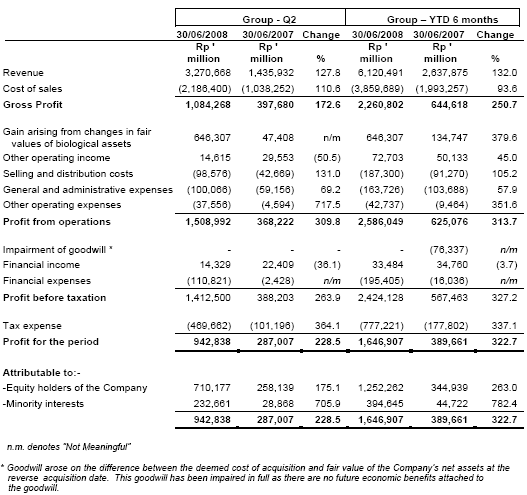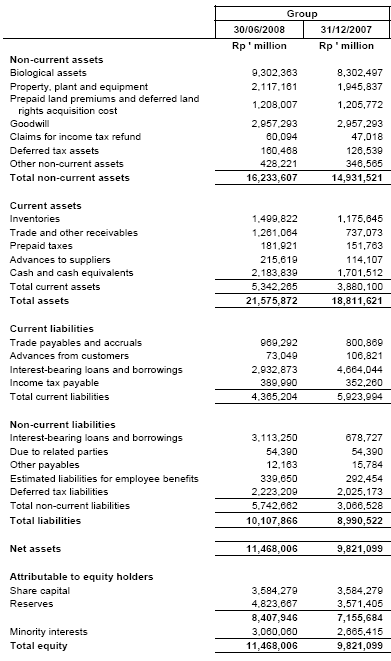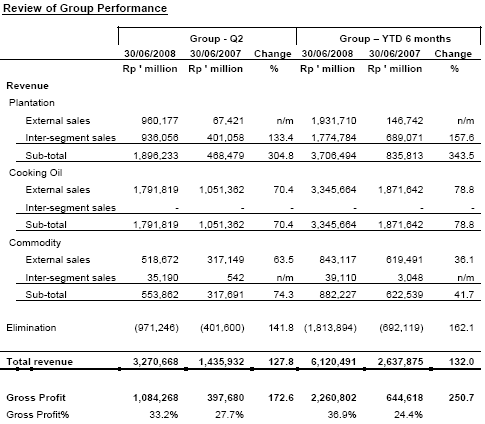Search


Review of Group Performance

Revenue and Gross Margin: The Group posted a strong set of results in the quarter, with revenue growth of 128% from Rp1.4 trillion in Q2 2007 to Rp3.3 trillion in Q2 2008. A positive contribution from the subsidiaries acquired in 2007, particularly Lonsum, coupled with higher volume growth and higher selling prices of Crude Palm Oil ("CPO") and edible oil products were the key drivers for the strong performance. On a year-to-date basis, revenue increased by 132% compared with same period last year. In line with the strong revenue performance, overall gross profit margin for the quarter and year-to-date outperformed the results of the comparative period of last year.
Plantation division continued to deliver strong growth in Q2 2008, revenue surged by 305% to Rp1.9 trillion driven largely by favorable CPO prices, higher volume growth and additional contribution from the acquired subsidiaries, notably Lonsum which contributed about Rp1.0 trillion of revenue. CPO volume increased from 69,035 MT in Q2 2007 to 175,080 during the quarter largely driven by the acquisition of Lonsum. On year-to-date basis, revenue for the first half 2008 soared to Rp3.7 trillion, up 344% from Rp0.8 trillion a year ago.
Cooking oil and fats division continued to register strong momentum with revenue growth of 70.4% from Rp1.1 trillion in Q2 2007 to Rp1.8 trillion in Q2 2008. The improved sales came on the back of higher selling prices and higher sales volume of consumer pack cooking oil in the domestic Indonesian market. For the first half 2008, this division posted a revenue growth of 79% and higher operating profit margins from the uptrend of selling prices and volume growth.
Commodities division's revenue increased 74% in Q2 2008 and up 42% for the year-to-date basis. This was attributable to the increase in the average selling price of copra and palm oil-based products and as well as higher export of crude coconut oil.
Gain arising from changes in fair values of biological assets for the first half 2008 was Rp646 billion, the gain attributed largely to higher projected CPO price, partly offset by higher discount rate.
Biological assets comprise primarily oil palm plantations, rubber plantations and other crops. Mature oil palm trees produce fresh fruit bunches ("FFB"), which are used to produce CPO and palm kernel ("PK"). The fair values of oil palm plantations are determined using the discounted future cash flows of the underlying plantations. The expected future cash flows of the oil palm plantations are determined using the forecasted market price of FFB which is largely dependent on the projected selling prices of CPO and PK in the market.
Profit from Operations in the quarter rose by 310% to Rp1.5 trillion. Higher profits were due to the strong performance from all business divisions, positive financial effects from the new subsidiaries and gain arising from the changes in the fair values of biological assets. These profits were achieved despite (i) increased selling and distribution costs arising mainly from higher Indonesia export tax rate; (ii) higher G&A expenses arising from the inclusion of newly acquired subsidiaries, and higher salaries and wages attributed mainly to additional provision for employee benefits, salary rate adjustments and increased headcount; (iii) higher depreciation and amortization arising from the new subsidiaries, and (iv) higher other operating expenses attributed to loss on plasma receivables amounting to Rp13 billion, and stock losses and write-off of obsolete stock of Rp20 billion. In addition, included in Q2 2007 other operating income was a Rp39 billion gain on sales of short term investments and a foreign currency loss of Rp11 billion.
Net Profit After Tax for the quarter increased by 229% or approximately Rp656 billion to Rp943 billion. Included in Q2 2008 net profit after tax was higher interest expenses relating to the loans obtained to fund the acquisition of Lonsum, and higher income tax expenses. The Group posted a net profit after tax growth of 323% for the first half 2008.
Biological assets increased from Rp8.3 trillion in Dec 2007 to Rp9.3 trillion primarily due to additional planting cost of oil palm and gain arising from the changes in fair value of biological assets during the first half 2008. The increase in other non-current assets was due to higher advances for plasma projects and an advance for long term investments.
The increase in current assets was attributed largely to (i) higher inventory of CPO and edible oil finished products, (ii) increase in trade receivables on higher sales of edible oil products and copra-based products, (iii) higher advance to suppliers for purchase of goods, equipment and services, and (v) higher cash and cash equivalents attributed to net cash inflow from operating activities and net cash inflow from financing activities, which arose from higher bank borrowings. This was partially offset by cash outflows for investing activities such as acquisitions of property, plant and equipment, and biological assets.
Trade payables and accruals rose by Rp0.2 trillion to Rp1.0 trillion on higher purchases of copra. Higher income tax payable was in line with higher profits during the period.
Non-current interest bearing loans and borrowings increased from Rp0.7 trillion in Dec 2007 to Rp3.1 trillion in June 2008 due to the refinancing of US$160 million and Rp1.0 trillion of 1-year bridging loan facilities to 5-year term loan in the second quarter 2008. The decrease in short-term loans and borrowing was because of the aforesaid refinancing exercise.
Estimated liabilities for employee benefits showed an increase in the first half of 2008 due to additional provision in compliance with the Indonesian labor law. The higher deferred tax liabilities were in line with the gain arising from changes in fair values of biological assets.
The recent fall in petroleum prices and higher CPO stock in Malaysia have led to a fall in the global CPO prices. Despite this, the outlook for palm oil demand remains positive mainly due to growth in China and India, and the growing demand for biodiesel. Inflationary pressures may increase the cost of labor and raw materials.
The Group will continue to focus on optimizing the cost of production, and increasing production of CPO and sales of branded edible oil products. This will ensure the Group is well positioned to face the challenges ahead.